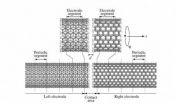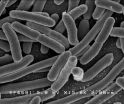(Press-News.org) (PHILADELPHIA) – Heavy drinking damages the body in many ways. In addition to liver failure, alcoholics are at a much greater risk of developing pneumonia and life threatening acute respiratory distress syndrome (ARDS), for which there is no treatment. Researchers suspect that alcoholics are more susceptible to these lung diseases because the immune system in the lung is no longer strong enough to protect from infection and damage, but, it had been unclear why the immune system in the lung fails.
Now, researchers at Thomas Jefferson University have discovered that one of the keys to immune system failure in the lung is a build-up of fat, a finding that offers both a novel explanation for lung disease and offers the possibility of a new treatment.
"We call it the alcoholic fatty lung," says lead researcher Ross Summer, M.D., an associate professor in the division of Pulmonary and Critical Care Medicine and the Center for Translational Medicine at Thomas Jefferson University. "The fat accumulation in the lungs mimics the process that causes fat to build up and destroy the liver of alcoholics," he adds.
When people drink, liver cells begin to produce fat, possibly as a defense mechanism against the toxicity of the alcohol. Over extended and frequent alcohol exposure, the fat accumulates and heavy drinkers develop so called "fatty liver disease". The fat build at first impairs liver function but can also cause scarring that eventually leads to liver failure.
The lungs, however, also contain a subpopulation of cells that make fat. Surfactant producing cells expel a fatty secretion onto the inner lining of the lung to keep the airways properly lubricated during breathing. Dr. Summer and colleagues wondered whether these surfactant cells might behave in a similar way to liver cells after extended alcohol exposure by also accumulating fat.
After extended exposure to alcohol in rats, the researchers noticed that surfactant cells increased their production of triglycerides by 100 percent and free fatty acids by 300 percent, compared to rats fed an non-alcoholic diet with the same number of calories. The researchers also noticed fat-up not only in surfactant cells but also in lung macrophages, which are immune cells that normally engulf and digest bacteria or sick cells in the lung.
"It's likely that the macrophages try to engulf the excess fat in order to protect the cells in the lung, but in doing so, they become less effective sentinels against infection and disease," said Summer. Indeed, the researchers showed that these fat-exposed macrophages were much less effective at killing bacteria than normal macrophages.
If the same process can be observed in humans – an avenue of research that Dr. Summer is currently exploring – it would suggest that that lipid lowering drugs (a class of drugs called fibrates) could be useful in treating alcohol-related pneumonia and in preventing the development of ARDS.
INFORMATION:
Research was supported by funding from the National Institutes of Health (NIH) R01HL105490 and R37 AA11290
The authors report no conflict of interest.
For more information, contact Edyta Zielinska, 215-955-5291, edyta.zielinska@jefferson.edu.
About Jefferson
Thomas Jefferson University (TJU), the largest freestanding academic medical center in Philadelphia, is nationally renowned for medical and health sciences education and innovative research. Founded in 1824, TJU includes Jefferson Medical College (JMC), one of the largest private medical schools in the country and ranked among the nation's best medical schools by U.S. News & World Report, and the Jefferson Schools of Nursing, Pharmacy, Health Professions, Population Health and the Graduate School of Biomedical Sciences. Jefferson University Physicians is TJU's multi-specialty physician practice consisting of the full-time faculty of JMC. Thomas Jefferson University partners with its clinical affiliate, Thomas Jefferson University Hospitals.
Article reference: F. Romero, et al., "Chronic alcohol ingestion in rats alters lung metabolism, promotes lipid accumulation, and impairs alveolar macrophage functions," AJRCMB, DOI: 10.1165/rcmb.2014-0127OC, 2014.
ESZ 6/30/2014
Fat damages the lungs of heavy drinkers
Alcohol causes fat build-up in the lungs of rats, impairing immune function and possibly explaining why alcoholics are more likely to develop lung disease
2014-06-30
ELSE PRESS RELEASES FROM THIS DATE:
Researchers create quantum dots with single-atom precision
2014-06-30
A team of physicists from the Paul-Drude-Institut für Festkörperelektronik (PDI) in Berlin, Germany, NTT Basic Research Laboratories in Atsugi, Japan, and the U.S. Naval Research Laboratory (NRL) has used a scanning tunneling microscope to create quantum dots with identical, deterministic sizes. The perfect reproducibility of these dots opens the door to quantum dot architectures completely free of uncontrolled variations, an important goal for technologies from nanophotonics to quantum information processing as well as for fundamental studies. The complete findings are ...
Missing protein explains link between obesity and diabetes
2014-06-30
Singapore, 30 June 2014—Scientists from the Institute of Molecular and Cell Biology (IMCB), a research institute under the Agency for Science, Technology and Research (A*STAR), have discovered that obese individuals lack a protein that is essential for regulating blood glucose levels, causing them to face higher risks of developing diabetes. The protein is one of the first molecular links found between obesity to diabetes and is potentially a target for treatment or prevention of diabetes in obese individuals.
Obesity and diabetes are two common health problems faced ...
Joint education standards help GI, hepatology programs meet accreditation requirements
2014-06-30
Bethesda, MD (June 30, 2014) — A team of representatives from five gastroenterology and hepatology societies have created a toolbox designed to help gastroenterology training directors meet the Accreditation Council for Graduate Medical Education (ACGME) Internal Medicine Subspecialty Reporting Milestones requirements while training fellows to independently care for patients. Thirteen core tasks, known as "entrustable professional activities," or EPAs, have been identified that define the work of gastroenterologists and hepatologists. A toolbox for each task includes, among ...
Insights from nature for more efficient water splitting
2014-06-30
Water splitting is one of the critical reactions that sustain life on earth, and could be a key to the creation of future fuels. It is a key in the process of photosynthesis, through which plants produce glucose and oxygen from water and carbon dioxide, using sunlight as energy. However, there are still significant mysteries about the process. Nature's own water-splitting catalysts?which are based on manganese rather than more common elements such as iron, copper, or nickel?are incredibly efficient, and scientists have long been studying why this is so and how we can mimic ...
A step closer to bio-printing transplantable tissues and organs: Study
2014-06-30
Researchers have made a giant leap towards the goal of 'bio-printing' transplantable tissues and organs for people affected by major diseases and trauma injuries, a new study reports.
Scientists from the Universities of Sydney, Harvard, Stanford and MIT have bio-printed artificial vascular networks mimicking the body's circulatory system that are necessary for growing large complex tissues.
"Thousands of people die each year due to a lack of organs for transplantation," says study lead author and University of Sydney researcher, Dr Luiz Bertassoni.
"Many more are ...
Scientists develop force sensor from carbon nanotubes
2014-06-30
A group of researchers from Russia, Belarus and Spain, including Moscow Institute of Physics and Technology professor Yury Lozovik, have developed a microscopic force sensor based on carbon nanotubes. The device is described in an article published in the journal Computational Materials Science and is also available as a preprint.
The scientists proposed using two nanotubes, one of which is a long cylinder with double walls one atom thick. These tubes are placed so that their open ends are opposite to each other. Voltage is then applied to them, and a current of about ...
A first: Scientists show bacteria can evolve a biological timer to survive antibiotics
2014-06-30
The ability of microorganisms to overcome antibiotic treatments is one of the top concerns of modern medicine. The effectiveness of many antibiotics has been reduced by bacteria's ability to rapidly evolve and develop strategies to resist antibiotics. Bacteria achieve this by specific mechanisms that are tailored to the molecular structure or function of a particular antibiotic. For example, bacteria would typically develop drug resistance by evolving a mutation that breaks down the drug.
Researchers at the Hebrew University of Jerusalem set out to determine if they could ...
More carbohydrates make trees more resistant to drought
2014-06-30
Water is the limiting factor for many plants and trees. Consequently, there are grave concerns that the rainfall patterns altered by climate change could trigger a forest decline on a global scale. According to climate researchers, Switzerland is also affected: The climate models even project hotter and drier summers for this country. An international research team headed by Michael O'Brien, an ecologist at the University of Zurich, is now studying which factors govern the resistance of tropical trees to periods of drought. As the scientists reveal in their study published ...
Women's groups recommended by WHO as an intervention to cut newborn deaths
2014-06-30
The World Health Organisation has recommended an intervention developed and tested by partners in four countries and UCL researchers to improve maternal and newborn health. The intervention involves groups of women working together in a four-stage facilitated process: 1) Identifying problems during pregnancy, delivery, and post-partum; 2) Developing strategies to address these problems; 3) Implementing these strategies; and 4) Evaluating the strategies.
A meta-analysis of research into Participatory Women's Groups was conducted by Dr Audrey Prost and others, largely ...
Cocaine addiction: Phase-specific biology and treatment?
2014-06-30
Philadelphia, PA, June 30, 2014 – Current pharmacotherapies for addiction follow the dictum "one size fits all". Medications are prescribed in the same way for all patients, regardless of whether they have just started experimenting with a drug or have an established drug habit. Even more troubling, there are no FDA-approved pharmacotherapies for some addictions, such as compulsive cocaine use.
Perhaps testing drugs in ways that focus on particular phases of addiction or particular clinical features of addiction, such as a patient's level of impulsivity, might advance ...
LAST 30 PRESS RELEASES:
Ketamine high NOT related to treatment success for people with alcohol problems, study finds
1 in 6 Medicare beneficiaries depend on telehealth for key medical care
Maps can encourage home radon testing in the right settings
Exploring the link between hearing loss and cognitive decline
Machine learning tool can predict serious transplant complications months earlier
Prevalence of over-the-counter and prescription medication use in the US
US child mental health care need, unmet needs, and difficulty accessing services
Incidental rotator cuff abnormalities on magnetic resonance imaging
Sensing local fibers in pancreatic tumors, cancer cells ‘choose’ to either grow or tolerate treatment
Barriers to mental health care leave many children behind, new data cautions
Cancer and inflammation: immunologic interplay, translational advances, and clinical strategies
Bioactive polyphenolic compounds and in vitro anti-degenerative property-based pharmacological propensities of some promising germplasms of Amaranthus hypochondriacus L.
AI-powered companionship: PolyU interfaculty scholar harnesses music and empathetic speech in robots to combat loneliness
Antarctica sits above Earth’s strongest “gravity hole.” Now we know how it got that way
Haircare products made with botanicals protects strands, adds shine
Enhanced pulmonary nodule detection and classification using artificial intelligence on LIDC-IDRI data
Using NBA, study finds that pay differences among top performers can erode cooperation
Korea University, Stanford University, and IESGA launch Water Sustainability Index to combat ESG greenwashing
Molecular glue discovery: large scale instead of lucky strike
Insulin resistance predictor highlights cancer connection
Explaining next-generation solar cells
Slippery ions create a smoother path to blue energy
Magnetic resonance imaging opens the door to better treatments for underdiagnosed atypical Parkinsonisms
National poll finds gaps in community preparedness for teen cardiac emergencies
One strategy to block both drug-resistant bacteria and influenza: new broad-spectrum infection prevention approach validated
Survey: 3 in 4 skip physical therapy homework, stunting progress
College students who spend hours on social media are more likely to be lonely – national US study
Evidence behind intermittent fasting for weight loss fails to match hype
How AI tools like DeepSeek are transforming emotional and mental health care of Chinese youth
Study finds link between sugary drinks and anxiety in young people
[Press-News.org] Fat damages the lungs of heavy drinkersAlcohol causes fat build-up in the lungs of rats, impairing immune function and possibly explaining why alcoholics are more likely to develop lung disease



